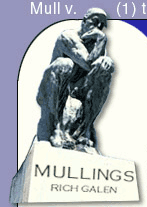|
|

|

Click here to keep up with Galen's Speaking Schedule
Looking for a back issue of Mullings? They're in the
Archives
Click here
to join the Mullings Movement!
Press Secretary 101
 Wednesday August 27, 2003
Wednesday August 27, 2003
This is another in an occasional series on how campaigns really work. To review the bidding, we are using a campaign for Congress in an open (no incumbent) seat as our model.
This time: The press secretary.
Just about every Congressional campaign has a press secretary. In this age of title creep, the person with that job might be called the Communications Director, but they won't be paid any more than they would have been as a press secretary.
New press secretaries want to do one thing: Write a press release with their name as the contact person, which they can then send to their mom.
Most people have an image of a press secretary like Scott McClellan dodging bullets from a cranky press corps in the White House briefing room; making high-level pronouncements on behalf of the Administration about the future of the known universe; or calmly walking across the White House lawn with the President before boarding Marine One.
Here's what real press secretaries, in real campaigns do. They sit at their desk with 12 empty Styrofoam coffee cups scattered on it, trying to think of a new headline which will attract the attention of a political editor who couldn't be less interested in his campaign, sitting atop a press release on a subject he has written about fifteen times before.
Most campaigns come down to about three or maybe four subjects. The value of a good press secretary is inventing new ways to say the same thing.
One of the first things a press secretary must do is to compile a press list of media which cover the district. This includes every daily newspaper, every weekly newspaper, every television station which does news and every radio station which does news.
Here's a tip for press secretaries: If you tune to a radio station and they consider a Nine Inch Nails tune to be an oldie - don't put it on the list.
Here's a tip for campaign managers: If you haven't actually seen the press list � it hasn't been compiled.
That list should have the name and e-mail addresses of: The city editor and political reporter of every daily; the main reporter (or more often the editor or publisher) of every weekly; the assignment editor and news director of every television station; and the news director of every radio station.
In addition the list should include the day of the week each weekly is put to bed (if a weekly is put to bed on Wednesday afternoon, it is silly to schedule a candidate visit there on Wednesday night) and the name of the morning and afternoon drive-time hosts of those radio stations which do news. You should also have the name and e-mail for the Associated Press statehouse reporter who will most likely cover Congressional races around the state.
Stopping by the radio station in just about any small or mid-sized community in the nation will get you an on-the-air interview if you're running for Congress.
A press secretary should put out something resembling a press release or advisory once or twice a week. More if you get into a shouting match with your opponent. It should not be longer than one page.
At a minimum, a press advisory of the candidate's schedule should show up in everyone's e-mail box on Mondays just to show that the candidate is actively campaigning.
Any time a major personality in the district signs on to help the campaign - do a press release. It doesn't have to be Shakespeare, just get the name out there. Most of these releases will not generate news, what they will do is generate a sense of forward momentum among the press corps.
As the only person in the history of the world who was press secretary to both Newt Gingrich AND Dan Quayle, here are the two golden rules which I have lived by:
Don't lie to the press to protect your boss.
Don't sell out your boss to curry favor with the press.
A press secretary has to return every phone call. But every phone call doesn't have to be returned immediately.
On the Secret Decoder Ring page today: A link to the first column in this series Financing a Campaign, a two-line bio of my days with Messers Quayle and Gingrich and an explanation of that last line!
--END --
Copyright © 2003 Richard A. Galen
Current Issue |
Secret Decoder
Ring | Past
Issues | Email
Rich | Rich
Who?
Copyright �2002 Richard
A. Galen | Site design by Campaign
Solutions. | |
|
